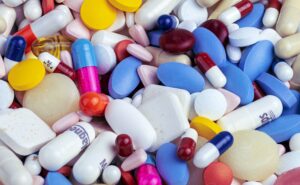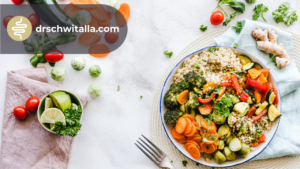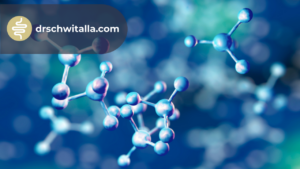Bloating and digestive issues can arise from an imbalance of the gut microbiota.
One of the major culprits: excessive or the “wrong” protein in your diet.
A number of studies have revealed that this can lead to an overgrowth of so called putrefactive bacteria in the gut causing gut microbiome dysbiosis (an imbalance of the microbiota ecosystem) leading to digestive symptoms and increasing the risk for heart disease
I discussed this issues also in depth in my books “The Toxic Microbiome” and das “Das Mikrobiom Komplott” (German).
Here are 2 reasons how can protein be harmful to the gut
“Wrong protein” sources: Protein fermentation by the gut bacteria results in “rotten egg gas” production, dysbiosis and inflammation
Especially animal protein is composed of other amino acids than plant protein.
A plethora of scientific evidence shows that merely 2 eggs or 100 g of red meat or 50 g of processed meat (sausages, bacon…) can turn a healthy gut ecosystem into a toxic gut environment.
A high concentration of 2 amino acid called methione and cysteine is converted into a toxic gas named Hydrogen sulfide or “rotten egg gas” that is shown to increase risk of gut inflammation in IBD by 3x and is also a potent carcinogen causing colorectal cancer when produced in excess in the gut.
“High protein” diets: Too much protein increase toxic metabolites in the gut, microbiome dysbiosis and changes the pH increasing inflammation risk
Especially in high-protein weight loss diets, including protein shakes e.g. protein intake may be 2–5 times greater than the daily dietary recommendations
High-protein diets increase the concentrations of inflammatory bacterial metabolites, such phenolic compounds, hydrogen sulfide (H2S), and ammonia, among others
Also, the colonic pH can change increase by too much protein leading to a suboptimal milieu for a healthy microbiome, causing dysbiosis, bloating, constipation and increasing inflammation, ultimately increasing colorectal cancer risk.
Protein eating tipps for a healthy gut microbiome
Protein is undoubtedly essential for our bodies.
Not all proteins are created equal.
The source, the quality and the amount of your protein intake can significantly affect your microbiome and your health
- Favor plant-based protein sources over animal proteins in your diet, such as legumes, nuts and tofu (albeit not allergic). Those are shown to reduce the risk of gut inflammation and cancer
- Try to focus an whole plant based foods and limit the amount of protein shakes, vegan surrogate products such as vegan sausages etc
- Be mindful about the daily amount of protein you consume.According to national guidelines and official recommendations an average adult body (18 – 55) albeit pregnant need only around 0.6 gram – 1 gram of protein per kg normal bodyweight.If you are a 60 kg person, this would be around 60 grams
Wenn du bereit bist, kann ich so weiterhelfen:
Darm Retreat: Heilen mit Ernährung
5h online Workshop Kurs – lerne wissenschaftlich basiert eine Strategie für die ideale Ernährung zur Optimierung der Darmgesundheit und der Immunfunktion, die auch im Alltag funktioniert. Erstelle unkompliziert einen 100% nährstoffdeckenden, antientzündlichen Ernährungsplan für Heilung und Prävention. Ausgewogen ernähren auch bei eingeschränkter Verträglichkeit von Lebensmitteln.
Als Speaker oder Berater buchen
Möchten Sie mich als Speaker für Ihr Event, Berater für ein Projekt, Scientific Advisor, Researcher oder Autor engagieren? Als PhD und ehemalige Wissenschaftlerin u.a. an der Harvard Universität und University of Cambridge, Autorin von 3 Büchern und zahlreichen Fachartikeln, Scientific Advisor für Firmen, Filmteams und Organisationen, Speaker auf Kongressen und Events bringe ich Expertise seit 2008 mit. Hier anfragen.
Discover the most exciting studies and actionable science on Microbiome, Gut-Brain and Nutrition research for healing, wellbeing and longevity
Join +4000 Readers of The Longevity Microbiome Journal.
Fridays in your inbox.
More Links
All the best


Dr. Sarah Schwitalla
PhD in molekularer Medizin und Biochemie 10 Jahre biomedizinische Krebs-Forschung und Pharmaindustrie Erfahrung TU München, Harvard Medical School, University of Cambridge.
Referenzen
Diether NE, Willing BP. Microbial Fermentation of Dietary Protein: An Important Factor in Diet–Microbe–Host Interaction. Microorganisms. 2019;7(1). doi:10.3390/MICROORGANISMS7010019
Magee EA: Contribution of dietary protein to sulfide production in the large intestine: an in vitro and a controlled feeding study in humans. 2000;72(6):1488–1494. doi:10.1093/ajcn/72.6.1488
https://microbiomejournal.biomedcentral.com/articles/10.1186/s40168-019-0704-8#ref-CR82 Oliphant, K., Allen-Vercoe, E. Macronutrient metabolism by the human gut microbiome: major fermentation by-products and their impact on host health. Microbiome 7, 91 (2019). https://doi.org/10.1186/s40168-019-0704-8
https://www.efsa.europa.eu/sites/default/files/consultation/110712%2C0.pdf
The Toxic Microbiome
Zhang M, Juraschek SP, Appel LJ, Pasricha PJ, Miller ER, Mueller NT. Effects of High-Fiber Diets and Macronutrient Substitution on Bloating: Findings From the OmniHeart Trial. Clin Transl Gastroenterol. 2020;11(1):e00122. doi:10.14309/ctg.0000000000000122




